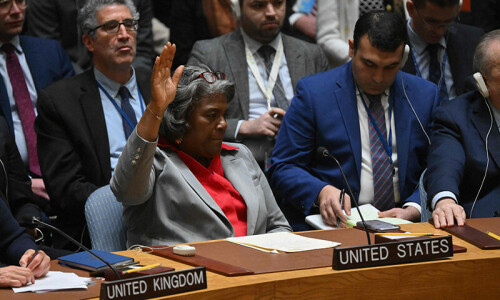
• Ceasefire resolution calls for release of prisoners, urgent expansion of aid delivery
• Veto avoided as Washington abstains; 14 members vote in favour
• Guterres warns failure to implement resolution ‘would be unforgivable’
• Russia angry over replacing word ‘permanent’ with weaker language
UNITED NATIONS: The UN Security Council finally passed a resolution on Monday, demanding an immediate ceasefire in Gaza during Ramazan, an unconditional release of prisoners, and urgent expansion of aid into the besieged Palestinian enclave.
Reacting promptly after the vote, UN Secretary General António Guterres emphasised that the long-awaited resolution must be implemented as the council’s failure to do so “would be unforgivable”.
The decision came after last-minute discussions within the council successfully avoided another potential veto.
The draft resolution was passed, because the US did not use its veto and abstained.
However, a Russian amendment failed due to insufficient votes. In the substantive vote, 14 members voted in favour of the resolution.
US Ambassador Linda Thomas-Greenfield emphasised that in adopting the resolution, the Security Council demonstrated support for ongoing diplomatic efforts led by Washington, Qatar and Egypt to achieve an immediate and sustainable ceasefire, secure the release of all prisoners, and alleviate the suffering of Palestinian civilians in Gaza.
“The United States fully supports these critical objectives,” she affirmed. “These objectives formed the basis of the resolution we proposed last week, a resolution that Russia and China vetoed.”
Thomas-Greenfield asserted that the US was tirelessly “engaged in diplomatic efforts to realise them on the ground”. She called on the council members to recognise that a ceasefire could have been achieved “months ago” had Hamas been willing to release the prisoners, accusing the group of obstructing peace efforts.
“Therefore, I urge the members of this council to unequivocally demand that Hamas accept the deal on the table,” she said.
Algeria, the only Arab member of the council, expressed the hope that the draft would put an end to the massacres that have been going on for five months.
“Finally, the Security Council is responding to the calls of the international community and the [UN] secretary general,” Algeria’s Ambassador Amar Benjama said.
Message to Palestinians
The draft, he added, conveys a clear message to the Palestinian people: “The international community, in its entirety, did not abandon you.”
This, he said, was the beginning to “meet the aspiration of the Palestinian people…to put an end to the bloodbath without any conditions”.
The meeting commenced with Ambassador Yamazaki leading a moment of silence to honour the victims of the terrorist attack in Moscow on Friday.
Mozambique’s Ambassador Pero Afonso, speaking on behalf of the 10 elected members of the council, introduced the draft, underscoring the pressing need to address the dire situation in the Gaza Strip.
He pointed out that the council had the mandate under the UN Charter to pursue these objectives, which was the primary motivation behind the proposed text.
Russian Ambassador Vassily Nebenzia expressed strong disapproval of replacing the word “permanent” in operative paragraph with weaker language, deeming it “unacceptable”. He emphasised that their voting instructions specifically included the term “permanent,” and any alteration could be interpreted as tacit approval for Israel to persist with its attacks.
Consequently, Nebenzia’s delegation proposed an oral amendment to reinstate the word “permanent” in the draft resolution.
Persistent disagreements within the 15-member council, particularly among the five permanent veto-wielding members, had led to the rejection of several draft resolutions since the conflict began in October. The veto holders are China, France, Russia, the United Kingdom, and the United States.
Concise resolution
The resolution put before the council on Monday was concise, comprising only four operative paragraphs. It called for “an immediate ceasefire for the month of Ramazan respected by all parties leading to a permanent sustainable ceasefire”.
It also urged “the immediate and unconditional release of all hostages, as well as ensuring humanitarian access to address their medical and other humanitarian needs” and “that the parties comply with their obligations under international law in relation to all persons they detain”.
Additional provisions highlighted “the urgent need to expand the flow of humanitarian assistance to and reinforce the protection of civilians in the entire Gaza Strip”.
The draft reiterated the council’s demand for “the lifting of all barriers to the provision of humanitarian assistance at scale, in line with international humanitarian law” as well as previous UNSC resolutions.
Unusual activities unfolded in the council chamber as the meeting commenced. The Russian ambassador engaged in intense discussions with several top diplomats, including the Palestinian Observer and the ambassador for Malta, aiming to avoid a potential veto before the draft was put to a vote.
Meanwhile, Ambassador Yamazaki, presiding over the Security Council for March, observed calmly as members gathered in animated discussions before formally convening the session.
Published in Dawn, March 26th, 2024














































